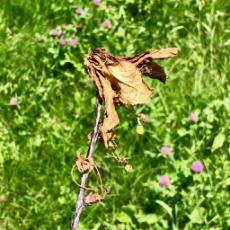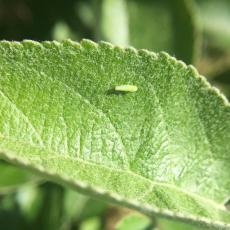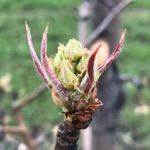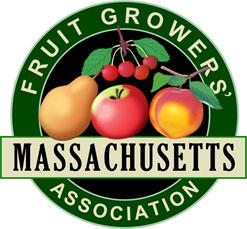Fruit Program News
-
Brown Marmorated Stink Bug on the uptick in Massachusetts orchard
September 11, 2018According to a recent (September 11, 2018) Healthy Fruit Pest Update, "UMass Extension has been tracking the invasive Brown Marmorated Stink Bug (BMSB), Halyomorpha halys, since 2012. For the past six years, the number of BMSB captured in pheromone-baited traps had remained relatively low, until now. Trap-capture data for 2018 have shown that, this year, BMSB populations are greater than any of the six previous years. Suspected feeding injury by stink bugs (allegedly BMSB) has been reported in a couple of orchards. However, the actual levels of damage have not been quantified yet." Growers are encouraged to monitor/scout their situation and only use control measures where damage by BMSB is documented or trap catches exceed threshold. For more information, see Brown Marmorated Stink Bug.
-
2018 apple maturity report updated
September 11, 20182018 apple maturity report updated, 11-September
http://ag.umass.edu/fruit/2018-apple-maturity-report
All observations from UMass Orchard, Belchertown, MA unless otherwise noted
-
Annual Summer Meeting of the Massachusetts Fruit Growers' Association
July 4, 2018Annual Summer Meeting of the Massachusetts Fruit Growers’ Association
and UMass Orchard tour, in cooperation with University of Massachusetts Fruit Team
TUESDAY, July 10, 2018
UMass Cold Spring Orchard
391 Sabin St., Belchertown, MassachusettsFor more information and to pre-register on-line using a credit card...
Or to mail in your registration...
To request Accessibility accomodations for this event, please visit the UMass disability services website and fill out a brief request form. https://www.umass.edu/disability/events
-
What was your UMass Extension Fruit Team up to last year? (FY 2017, which runs 1-October, 2016 to 30-September, 2017)
July 3, 2018Orchards, vineyards, and fruit farms provide open space and vistas that enhance the rural character and quality of life in Massachusetts. Land that adjoins agriculture provides habitat for native species of plants and animals and corridors for their movement or expansion. To remain a vital part of the Massachusetts economy, however, both new and established farmers must learn to produce crops sustainably and adapt production systems to market opportunities. For example, new varieties provide fruit farmers with opportunities for enhanced production, quality, and increased sales.
UMass Extension provides farmers with access to current research information on new species and alternative varieties, advanced horticultural techniques, pest biology and management procedures, marketing and business strategies. Research on pest-ecology and management informs approaches reducing chemical use and increasing fruit quality. The combination of knowledge and resources provided by Extension forge successful partnerships with Massachusetts fruit producers, fostering a more secure, diverse and healthful food supply for the Commonwealth.
Fruit Team outputs and impacts (FY 2017)
- The UMass Extension Fruit Team hosted, organized and presented research at 67 meetings across the Northeast. At these events we shared vital information ranging from invasive insect management to time sensitive horticultural guidance to climate mitigation strategies and integration of cutting edge agricultural technologies.
- We conducted 28 on-farm research and demonstration projects, many at the UMass Orchard in Belchertown, and some at collaborating farms. Fruit Team projects addressed research needs such as apple thinning trials, apple rootstock performance evaluations, cold hardy grape cultivar evaluations and pollinator habitat conservation and many more.
- Fruit Team members produced and updated 73 publications. These publications included newsletters, production guides, Fact Sheets and articles. An ongoing library of works by team members continues to provide reference material and reliable resources to growers, service providers, gardeners, students, and educators in the field.
- Over 1,102 diagnostic consultations provided growers with information essential to mitigating pest damage and adapting to changing conditions. Phone calls, meetings, and email correspondence advised up-to-date protocols and pre-emptive pest and horticultural management tactics.
- Websites and social media expanded the team’s reach to over 50,400 people who may have been unable to attend workshops and conferences. This, along with other research and timely outputs, contributes to socially and environmentally responsible, and profitable fruit production in Massachusetts.
Selected grants
- Brown A., and W. Autio. UMass Amherst Student Farm Food Safety Improvement. $9,832.00.
- Clements, J. iPiPE Crop Pest Program for Northeast Apples. $54,420
- Petit, E., Evaluation of Wine Juice Quality Following Various Shoot and Cluster Thinning Regimes. UMass Center for Agriculture, Food and the Environment Summer Scholars Program. $5,000
- Sandler, H., K. Campbell-Nelson, A. Tuttle, S. Schloemann, K. Ghantous, M. Sylvia, M. Dicklow and D. Cooley, Multi-level Extension delivery to support IPM for Massachusetts vegetable and fruit growers. USDA-NIFA, Extension Implementation Program. $582,000
Selected publications
- Autio, W., J. Krupa, J. Clements and W. Cowgill. 2017. Performance of Honeycrisp Apple Trees on Several Budagovsky, Cornell-Geneva, and Pillnitz Rootstocks – an update on the Massachusetts planting of the 2010 NC-140 Apple Rootstock Trial. Fruit Notes Vol. 82, No. 2.
- Greene, D., A. Crovetti, and J. Pienaar. 2016. Development of 6-benzyladenine as a chemical thinner. HortScience 51: 1448-1451.
- Zeng, Q., D. R. Cooley, E. W. Garofalo, et al. 2017. Comparative genomics of Spiraeoideae-infecting Erwinia amylovora strains revealed higher genetic diversity and suggested an origin of global dispersal. Molecular Plant Pathology. (Accepted)
Selected collaborative projects
- USDA – Refining an Attracticidal Sphere Management System for Spotted Wing Drosophila (SWD) in Small Fruit Production (Schloemann, Tuttle, and Garofalo)
- Massachusetts Fruit Growers’ Association – Swing Arm Trellis Demonstration for Blackberry and Black Raspberry Production in New England (Schloemann)
- USDA Hatch – NC-140 Apple/Peach Rootstock Regional Research Project (Autio, Clements)
- Connecticut Agricultural Experiment Station/Northeast SARE – Organic Management of Blossom (Fire) Blight in Apples (Cooley)
- Adama USA – Influence of Metamitron on Fruit Set of McIntosh Apples (Greene)
Fruit Team members
- Faculty – Wesley Autio, Daniel Cooley, Duane Greene, Jaime Pinero, Elsa Petit
- Extension Educators – Sonia Schloemann and Jon Clements
- Extension/Research Support Staff – Elizabeth Garofalo
- UMass Cold Spring Orchard Staff – Shawn McIntire and Kristen Hanley
-
Brown rot in tart cherry...
June 18, 2018 A particularly nasty case of brown rot has afflicted shoots of Danube and Balaton tart cherry at the UMass Orchard in Belchertown. It was confirmed as brown rot by Dan Cooley's lab, there was the thought it might bacterial canker, but that has been ruled out. Many shoots are afflicted and will have to be pruned out. Interestingly, we wonder if it is a case of European brown rot, which appears to be quite more virulent than the garden variety American brown rot. This outbreak emphasized the importance of timely bloom fungicide sprays, as this is when the brown rot infection got started. Fruits will have to be protected with fungicides when ripening too. For more information on European vs. American brown rot, see this article in Good Fruit Grower. And for timely fungicide application choices, see see the Cherries Spray Table in New England Tree Fruit Management Guide.
A particularly nasty case of brown rot has afflicted shoots of Danube and Balaton tart cherry at the UMass Orchard in Belchertown. It was confirmed as brown rot by Dan Cooley's lab, there was the thought it might bacterial canker, but that has been ruled out. Many shoots are afflicted and will have to be pruned out. Interestingly, we wonder if it is a case of European brown rot, which appears to be quite more virulent than the garden variety American brown rot. This outbreak emphasized the importance of timely bloom fungicide sprays, as this is when the brown rot infection got started. Fruits will have to be protected with fungicides when ripening too. For more information on European vs. American brown rot, see this article in Good Fruit Grower. And for timely fungicide application choices, see see the Cherries Spray Table in New England Tree Fruit Management Guide. -
Potato leafhopper have arrived...
June 16, 2018 Potato leafhopper (PLH) have arrived in Massachusetts, and pose a pest threat to young apple trees in particular. Scout for the presence of PLH in young apple planting and treat with an effective insecticide before they damage and stunt apple foliage on newly planted trees. PLH on older, bearing orchards do not present as much a threat.
Potato leafhopper (PLH) have arrived in Massachusetts, and pose a pest threat to young apple trees in particular. Scout for the presence of PLH in young apple planting and treat with an effective insecticide before they damage and stunt apple foliage on newly planted trees. PLH on older, bearing orchards do not present as much a threat. -
Gypsy moth!
May 18, 2018Gypsy moth caterpillars are actively chewing foliage in orchards (where they occur) as can be seen here at the UMass Orchard in Belchertown. Do not be too complacent about gypsy moth, particularly young apple trees/new plantings. (They don't seem to bother stone fruit.) B.t. (Dipel, etc.) can be used to (eventually) control them, but must be used NOW when they are small, and it will take a while to work. Almost any petal fall insecticide (carbaryl, Imidan, etc.) will give quick knock-down and is highly recommended where they are doing a lot of chewing! For more information on gypsy moth, see the UMass Extension Landscape Message dated May 18, 2018. (Click on the Insects link.)
-
Small Fruit Twilight Meeting, May 24, 2018 at Ward's Berry Farm, Sharon, MA
May 15, 2018Come join Sonia Schloemann (UMass) and Heather Faubert at Ward’s Berry Farm, 614 South Main St., Sharon, MA on Thursday May 24, 2018 at 5:30 PM. Guest speaker: Dale Ila Riggs, The Berry Patch in Stephentown, NY, will speak on exclusion netting to protect fruit against spotted wing drosophila and other pests. Sonia Schloemann, UMass Small Fruit Specialist and Heather Faubert, URI, will speak on current blueberry topics such as pruning, nutrition and insect management. Meeting is free with annual dues payment of $40, or $20 for non-RIFGA members. Light dinner will be served. Two hours of pesticide recertification credit available. Registration is not necessary.
-
Current Bud Stages, May 14, 2018
May 14, 2018Current Bud Stages, UMass Cold Spring Orchard, Belchertown, MA. May 14, 2018
https://ag.umass.edu/fruit/bud-stages/current-bud-stages-may-14-2018
-
Current bud stage photos updated 04/30/2018
April 30, 2018
Current bud stage photos, UMass Cold Spring Orchard, April 30, 2018. Photos by Jon Clementshttp://ag.umass.edu/fruit/bud-stages/current-bud-stages-april-30-2018






